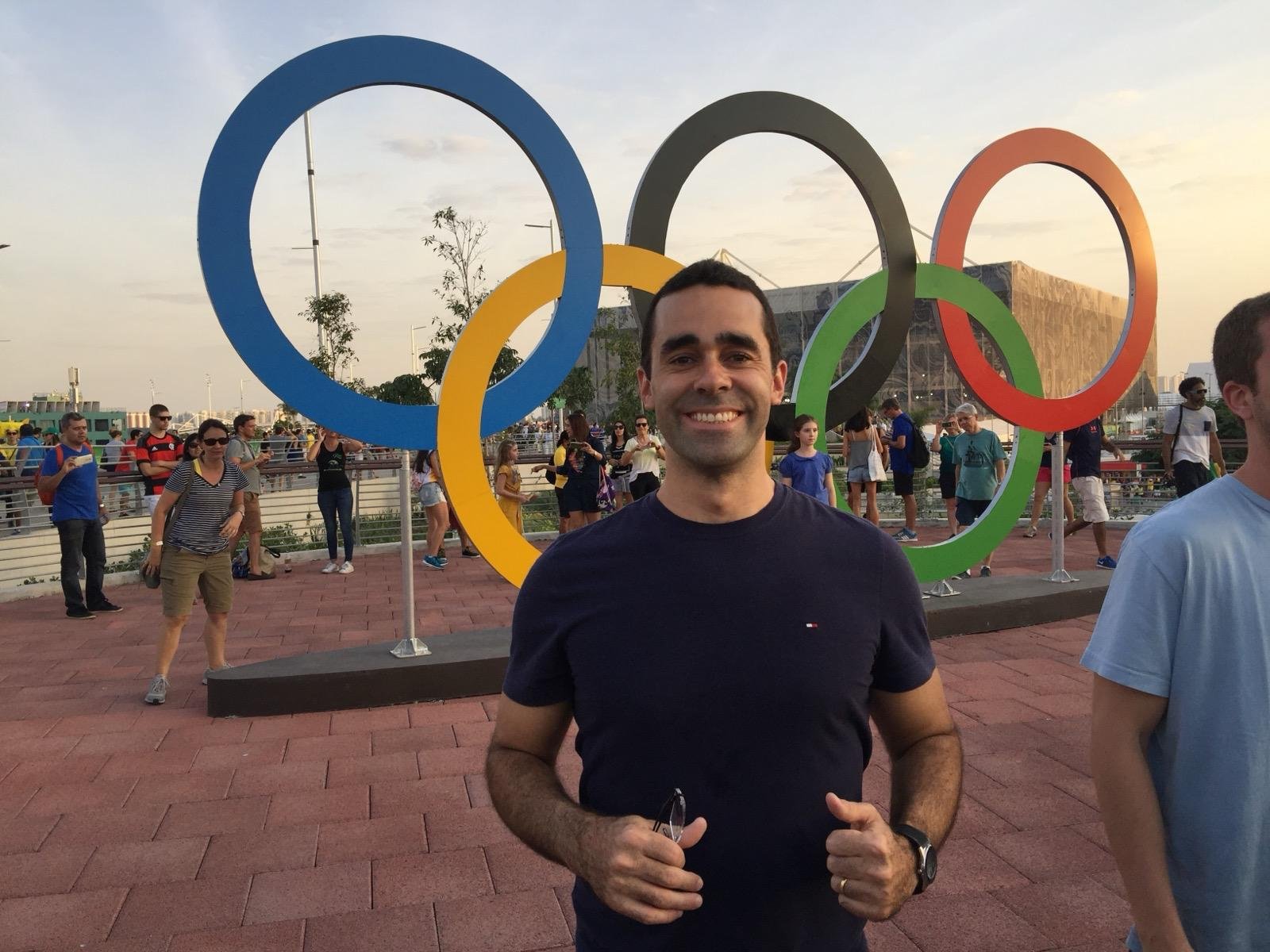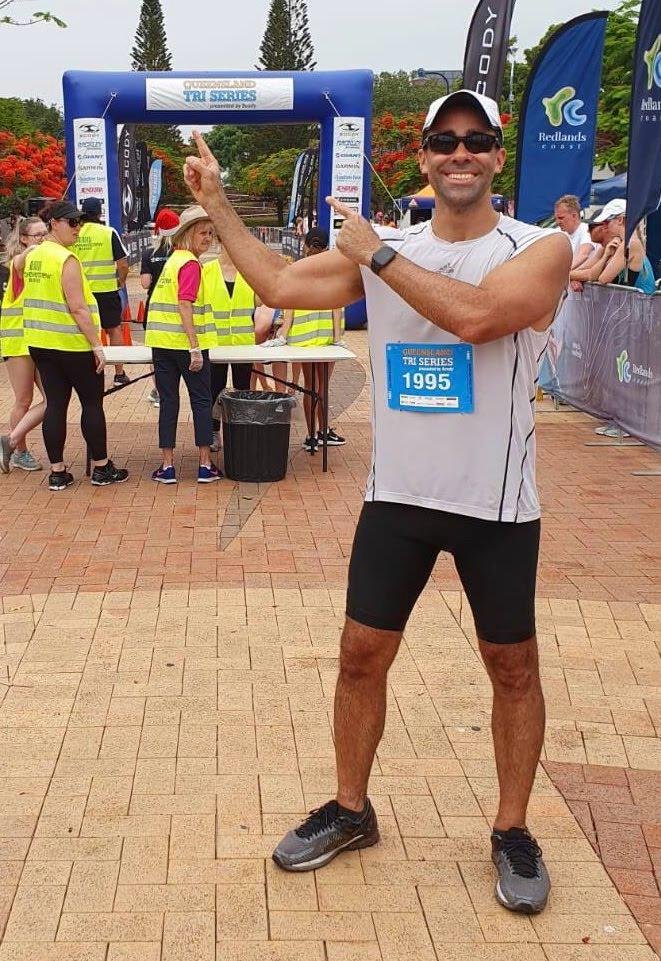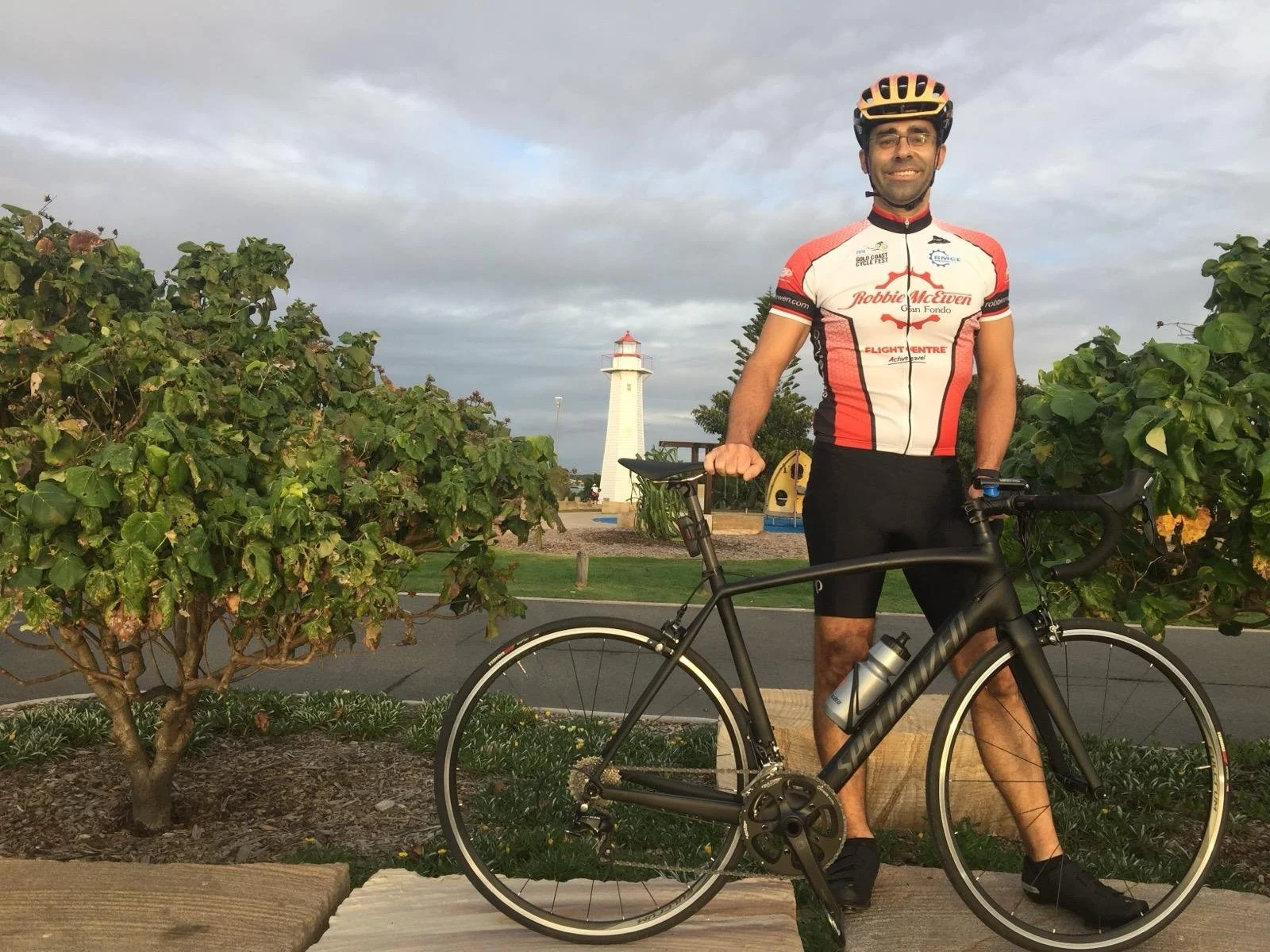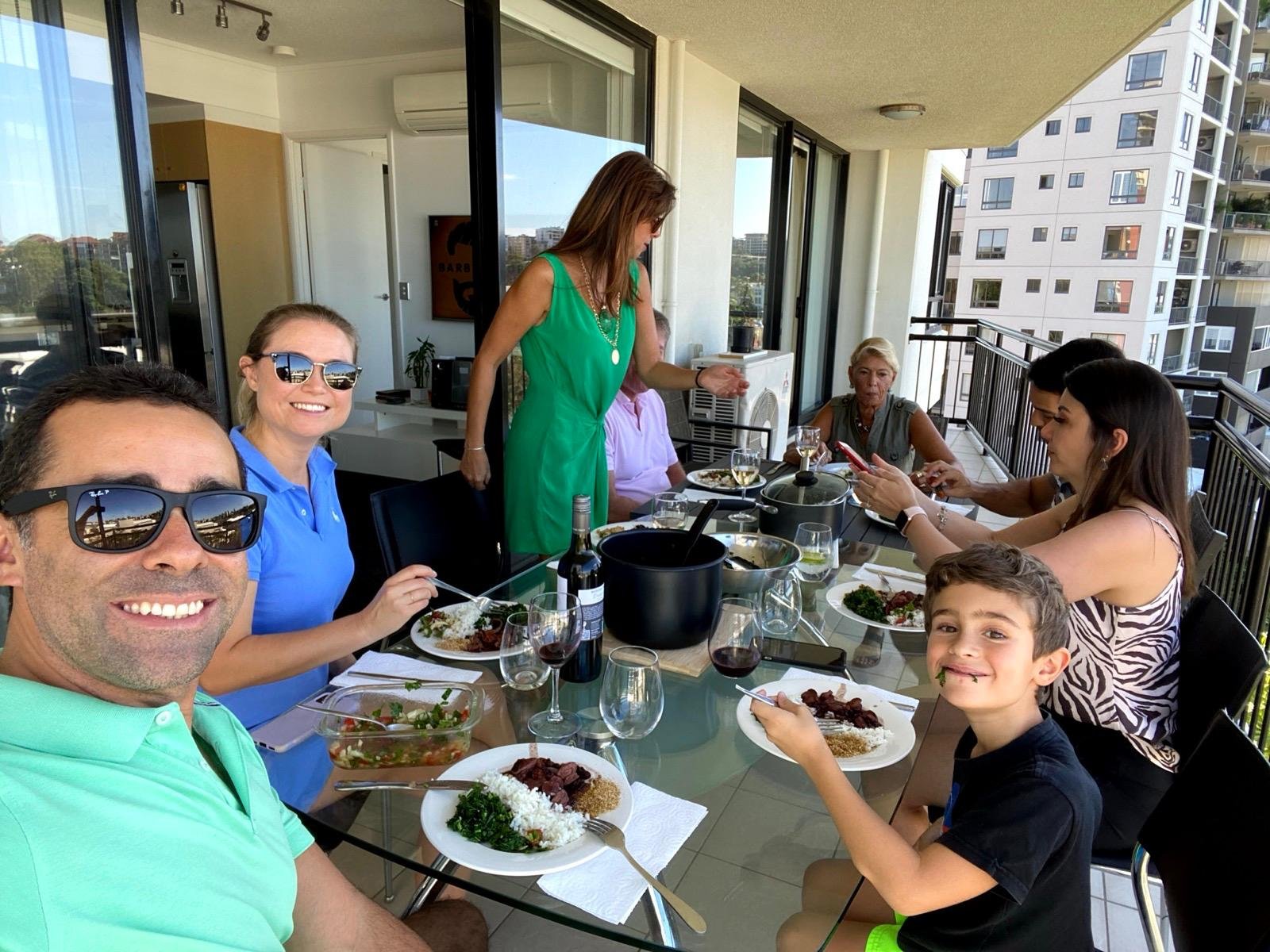Aurelio - São José dos Campos to Brisbane
A chat with my friend Aurelio on his move from Brazil to Australia
Having breakfast at Wild Canary Bistro, Brisbane with our friend Sophia
Aurelio is from Brazil, and when I lived in Brisbane we used to play tennis every Tuesday night at his home in Kangaroo Point.
Sarah: Aurelio, can you give us some background info? Where you're from and how you ended up in Brisbane…
Aurelio: Yes, for sure. I'm from Brazil, in a countryside of São Paulo they call São José dos Campos. I lived there up to 18 years old. After that, I moved to São Paulo, the capital, and I did my university degree in systems, and started to work for the mining company called Alcoa.
Then in 2008 I received a job proposal to go to Rio De Janeiro to work in a telecommunications company, who paid for me to study for four months to become a telecommunications engineer. It was a big move at the time because it was a different city, different culture, different industry, different field that I’d been working in. [The move to Rio] was a beautiful surprise.
I loved living in Rio, it was one of my best times in life, to be honest. The city is full of energy. Everybody's happy.
And it's quite an interesting city because you have people with high income, really rich, and people really poor. When you go to a beach, for example, it's the most democratic place that you can find, and you can see someone rich and someone really poor. Everybody sits together, everybody talks, everybody plays ball, everybody enjoys life together. And there are no differences.
2016 Olympics in Rio de Janeiro
You can go in a nightclub and you'll be like everybody together. No one complains. Different to São Paulo, which is more segregated. You go to fancy restaurants, just for fancy people. You go to simple restaurants, just for simple people. In Rio, it’s a mixture, you can find a famous actor walking in the street, no body bothers, you just accept them as they are.
I was talking with my Australian friend the other day who asked me the difference [between Australia and Brazil]. The difference is you go to the beach to play ball with someone, they invite you to a party they are going to that afternoon, even if you don’t know the person, they don’t care. Come and enjoy, and you become friendly with everyone.
And, and I think this is the main difference between societies. Because we live in a beautiful and blessed country like Australia.
Competing in a triathlon in Australia
[In Brazil] we have much less depression and health issues, mental health issues than here. I think because of this environment of friendship that everybody can communicate and talk with everyone.
That’s the difference, here I have some Australian friends, but it's not as easy to introduce in society, it takes time to build friendship networks. But [in Brazil] you arrive and on the first day you’re going to have ten friends. Everybody invites you to their home, invites you to another home, to another party and this makes things easier.
But on the other hand, like I always say, in life, nothing is perfect. [In Australia] it is much safer, economically stable and especially if you have kids like I have right now, it's much easier with kids growing up.
So when did you make the decision to come to Australia?
Around 2014, I was married to my former wife, she was a civil engineer. We had the economic crisis in Brazil. One of the first sectors [impacted] was civil construction. It was the world cup, and she lost her job. We’d just had a son. And then she came with the idea, let's try to go to another country, Canada or Australia, because they both have better immigration systems than the other countries like America or England or Europe.
So we booked in with an immigrant agent. He looked to me and said, ah, you have all these skills because you work in ICT and telecommunications. So we applied through the Australian Computer Society, and he said it would take three to six months. Then I received the letter from the Australian Computer Society in three days and [I realised], you are in demand. I didn't expect that!
At that time, I was working in the biggest telecommunication operator in Brazil. We had 100 million subscribers, and here we have 25 million population – we had four more subscribers in Brazil than the population of Australia. I was a project manager at that time, I had a lot of visibility. I was progressing and my career was really good. [I thought] I don't want to go right now, but my partner got quite depressed, so then I said, let's go to Australia.
We came to Australia, and the first six months it was tough for us because she studied English from zero. She was on a student visa and I got a working visa. Enzo [my son] was two years old at the time. I took a sabbatical year, playing tennis, riding bikes, enjoying life here [in Brisbane].
I like big cities, but when you have kids, Brisbane is smaller, a better environment. Definitely, if I were single, I would live in Melbourne – I love the restaurants, the atmosphere of the city, the sports events.
So in Brisbane I started working for the government, and a year ago I moved into another department. I work as a service manager now for ICT. I'm designing telecommunications and electrical things for a communication center.
It’s hard when you migrate to another country, basically you start your career from scratch. And its not easy. You have ups and downs in life. You question yourself.
First hiking experience in the glasshouse mountains, Queensland
[In Brazil] I was in a good position. I had meetings with the president of a large company. And it took time because and I came from private to public and a completely different environment. The rhythm in the private sector is frantic, but in the public sector you need to be reliable, especially in security agencies, we cannot have systems failing, because we put lives at risk.
Then I got lucky. After two years here in Australia, I got divorced. And at the beginning it was really tough for me. In my mind, many times I thought about returning to Brazil. But when you have a son, you need to put yourself … my son is more important. I need to settle down. Nowadays I don’t regret it, because I can see it’s a better life for him.
Sometimes when we return to Brazil, he says why we don't live in Brazil? Can I live in Brazil in the future? And I say, In the future, you can do whatever you want! (laughs)
What was the biggest change for you coming to Brisbane?
My mindset has changed a lot since I came to Australia. Before I got divorced, I thought that depression and mental health was [bullsh*t]. Now I realise that it’s not, I suffered from that. It’s a real thing, and you start to value it.
And in life we have ups and downs. You know, life is like a wave. We need to figure it out, when you put it on a straight line, this wave on average is going up.
Usually it’s going up and down, and up and down, and it stays flat. But if we can identify when it starts to go down, what we can do to make it go up, at the end of the day, [you can ensure] the line is going up.
I started to learn some techniques that help a lot, for example, exercise for me is fundamental. The weeks that I don't do exercise, I notice my mood is a really bad. I feel grumpy, I feel tired, sometimes I feel down. So exercise for me is so vital.
And tennis is the exercise I found for myself. I started later, when I was 28, I didn't start like you when you were a teenager.
I feel love when I go on the court, even if it's to teach my son or to teach someone else, or to play with my friends, I feel happy. And it doesn't matter if I'm serious or not, just to be on the court is my mental health.
I also found working for the government is a really good work life balance, and I have a good equilibrium between work and life. My son is on track with school, doing well at school. And that's it. I cannot open a complaint at the moment.
So I’ve started to see what I need to do for life. I read recently a book by Arnold Schwarzenegger. And one of the things he said is to be useful. It doesn’t matter what you do, be useful. Try to help someone, try to do something, try to improve your life. Try not to get down or let life get you down.
It's like you have money in the bank, but you don't put it in savings. With time, with inflation, you start to lose the power of your money, even if it's the same value. It’s important to do things. I always try to create a correlation between things in life. So that’s it. This is my story.
Yeah, I'm happy where I live. I think to make your life good, you need to have good place. You don't need a fancy place to live, but you need to be happy to arrive home. Open your door and think oh, this is my home. I always try and keep things organised, because when you enter in a home that is organised, you feel more proud.
Another important thing is to have work where you feel you can have an impact, impact a customer, impact society, impact something. It’s good to change something in the world.
I have a son, and I try to show him good values, what is correct or what is wrong. And what I teach him is, it doesn't matter what you do, doesn't matter if you fail. Failure is part of the process. And if you do something wrong, just admit it, recognise it, say sorry, and try to improve and not do it again. All people that try will fail.
And do something that you enjoy. It could be sports, it could be a paint class, could be meditation, could be surfing, friendship, wine club, whatever. But find something that you really enjoy in life, and then it’s the perfect combination. But even with that, you're going to have ups and downs.
Sarah: I remember you when I lived in Brisbane, you used to have the most amazing barbecues and asados, and you used to invite all sorts of people and it was just the best fun.
Feijoada with friends at Kangaroo Point in Brisbane, Australia
Aurelio: yes, I had lunch with Oliver last week, and we are going to organise a BBQ for his Mum [who’s visiting]. And so now he brings his Mum, Maria brings her parents too, as they are the same age. They can talk and we cook food.
And I think the beauty of food, or when I do a feijoada [brazillian bbq], it's not about the food. It's about connections and friendship.
It's like you came to my barbeque, we don’t sit at the table. We start like mid-day and finish sometimes at 10:00pm!
So what what surprised you most about Australia when you arrived?
The language first. Yeah, the English is completely different than American English. I took longer to get used to it, especially when I went to Melbourne the first year, I thought, oh, my English is good, I understand everyone. And then I come back to Queensland, I thought, whoa, I don't understand anything here. Especially when you go to the countryside, the English is more different for me.
[Another surprise was] how safe it is here. Like, I imagined it was safe, but I didn't imagine it was so safe. That you can walk with your phone or wallet, you can walk and relax. No one will bother you. You can walk at the midnight or during the day.
Another positive thing, when you read or listen to the news, you don't see too much crime. It's like we have [in other countries like South Africa], a lot of crime.
People really care about human life here. I see people really care about mental health. How you feeling? Are you ok?
Another thing that I love here in Australia is the inclusion. Everybody is the same. It doesn't matter your gender, doesn't matter your nationality. I feel you're more acceptable. Of course we still have some issues. Nothing will be perfect. But when you compare with other societies, here is a really fair country. And if you want to work, you can work any place. There is always availability for you. Like, you just don't find the job if you don't want to work.
My son, his dream is to be a doctor. I said Enzo, if you want to be a doctor, surgeon, I will invest in you, because later down the track you can invest in me (laughs). He can look after you when you become old and grey. And then we can travel all over the world playing sports together.
So if what do you miss most about your hometown?
Family. Yeah, family, because the main issue when you move to another country, you’re far from old friends. Yeah, you're far from family because, especially in my case, my siblings are there, my parents are there, my aunts, uncles, cousins are there. The only person that I have here from my family is my son.
My friends here in Australia become my family. And I treat you all, my family, my friends, as a family here. Because for me, friends are so important in life.
Another thing I miss, is the Brazilian food. In Australia, I miss the Brazilian food. Yeah, and we have more flavour, more salt and more everything, like feijoada, it's a punch of flavour! I also miss the informal foods like a finger foods or bar food, salsas, snacks, chips, small things, served with a beer and you talk about informal things.
You don't have too much schedule over there, you can come over anytime.
In Australia, it’s like oh, we need to talk to you. Ok, let's go out. When? In two months time. Two months time! I don't know what we're going to do tomorrow…
And this is what I miss. I miss these informal things. Because I think formal is important. But informal is important too. It makes life feel light. In general, you can have flexibility because your life is a full of surprise. It's a box of surprise. Food and family, food and family.
So one more question, if you could go back in time to meet the Aurelio that was leaving Brazil, what would you tell him before he left?
Many things … I'm a completely different man.
You know, we have phases in life. [I was a] younger teenager, beginning of career, married, came to Australia, then I got divorced. And I can tell you, I'm a better version than the old Aurelio.
I'm much more respectful. I understand that everyone has their own time. No one is the same. I [used to do] a lot more things, I was more agitated, and I learned that sometimes you need to be more strategic. You know, think a little bit ahead. You need to be respectful that everyone is different, and no one is the same as you.
And I wish I can go back in time and, and be more human towards society than I was before.
I was more strict, more binary because I came from systems and then later telecommunications. We work on zero or one, black or white. We don't have gray. We don't have the middle ground. And I realised that especially after the divorce, that life is not black and white.
Life has shades, and there could be infinity shades, not because you have a tended to go for black that you're black. You need to be flexible to understand that people are different too.
Aurelio and Pedro (my dog) going for a walk
We are all human, we are not robots, we are not machines. We have feelings, we have conceptions, we have history, we are completely different siblings growing up with the same family, the same parents, we are completely different.
Imagine, you can learn a lot from your partner, your friends or your family or coworkers. For me the divorce was like a shake up. Well, maybe I'm not 100% correct. Of course, the majority of the times I'm wrong, I admit it, say sorry and then start to improve. Every day you make a mistake, but every day you start to work hard to get better. Now you can see that you are always growing in life.
Sarah: You know, it's interesting, how something so painful and difficult like a divorce can actually bring out so much positive afterwards…
…without that, you wouldn't have grown and you wouldn't have learned, and you wouldn't be who you are today without that. You have to go through that rough stuff sometimes.
This is what I always say, like, every negative thing has a positive side. You just need to be open to be aware of these things.
And then you grow in life. But it’s difficult, sometimes you need a day to settle down. Don't do anything to others that you don't want to do for you. Don't mean to be negative. Don't say bad things about others. That is the basic principle. Do exactly what you think is correct for you, because definitely you're going to do the correct things in life.
Sarah: Love that. So what's one more thing you want to do in the world before the end? What do you still have on your bucket list Aurelio?
I wish to travel much more. Before having a son, I used to travel a lot. I love to learn new cultures, see new people, see different ways to doing this. Recently I travelled to Japan, and I saw many good things in that society. Look at Tokyo. One of the biggest metropolis in the world, but everything is super clean, everything is super organised, and you don’t have traffic jams.
The public transportation works really well and everything's really regulated and yeah, people care. You know, you cannot talk on your phone on the train because people are tired and sleep on the way home. They are respectful, and its beautiful. It's a good combination between modern and traditional.
I’ve waiting for an invitation from Kenya to see the family of Oliver, or to go to South Africa to see other family… (laughs) Travel is one of the things that we should do more in life.
And in the future, I would love to see my son fly alone. When he flies alone, I will feel like he has accomplished a chapter in his life. I have given him the wings to fly wherever he wants.
Thank you so much for sharing your story Aurelio. It’s the most amazing story. I can’t wait to type it up.
Aurelio: no worries and let me know if you have trouble understanding my accent… at least the computer understands me the majority of the time. Better than humans!








